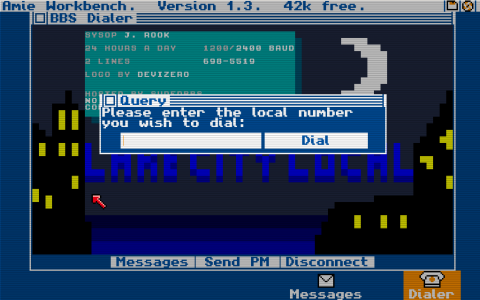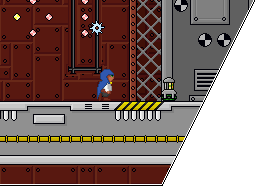Just as I'd said that I hadn't played any really good independent adventure games recently, one was handed to me by the unabbreviatable GameFAQs Classic Gaming boards, with the description that it was a nostalgia trip for 1988 networking. And that was good enough for me.  Digital - A Love Story Like Judith, which I wrote about last time, this is an adventure presented in a very unusual way - the whole game is spent on your character's computer, and you never see your character nor anybody else's - all communication is done online. Rather than items to pick up or examine or people to talk to, you're fed a stream of messages through various channels, acquire programs and scraps of information, and try to prompt people into responding by clicking "Reply" next to any of their messages. After a while of experimentation puzzling out what you're expected to do, you quickly start to feel real accomplishment at putting separate clues together and getting passwords, and generally learning about how the whole system works. After the first few minutes I was wondering if it would be completely trite to call it an 80s PC equivalent of Retro Game Challenge. It's very good at replicating the feel of the crude windowing and messaging systems of the time (the Amie is somewhere between the Amiga and the Commodore 64), while still keeping them easy to work with in the context of a game rather than spending too much time feeling like you're in an operating system. For example, it first it feels strange that you can only have certain windows open at a time and can't move them, but soon you realize that they're all perfectly placed so that you can get to where you want to go from almost any arrangement of open programs. You even get the unearthly screeching noise that modems used to make while dialling, which is amazing at first but which you'll quickly remember how little you miss after you've heard it twice (so it's nice that you can just skip past it). However, once you're past the introduction and the plot starts up, it becomes clear that it's a very different game - it's not just a simulation of that time, it's a story that happens to be told through this BBS simulation framework. I even made things much more difficult for myself than they needed to be early on, because I was so wary of downloading and running a program - especially when I emailed the person who had put it up and he said he'd found it posted anonymously! Given the popular image of the average users of these BBSes, I was very surprised to learn that this game was written by a woman - I don't want to sound like I'm being awfully sexist and implying that it's unusual that she had an interest in things like this instead of sticking to shoes, fingernails and cakes, but I can honestly only recall one game series that was designed by a woman, and it was an unadulterated exercise in sadism. What's more obvious in playing this game is that Christine Love is a writer - this game is another medium by which to tell a story, leaving you to discover and put together the parts of it for yourself as you explore through the world. And it's very well told - it gets gradually darker as it goes on, and I started to feel actual... unease at various events that happen throughout it. The end is particularly well done, and I hesitated for a long time, not helped by the fact that you can keep drawing it out and delaying it. Without meaning to be condescending at all, I also wonder how many people will understand it, seeing as some of the plot points involve things like exploiting buffer overruns to execute other code in memory and so on - but it's likely that if a game centred around memories of the proto-Internet is likely to appeal to you, you'll have a fair idea of what it's talking about. 2010-06-07 11:28:00 6 comments |
 Track the T
Track the T
